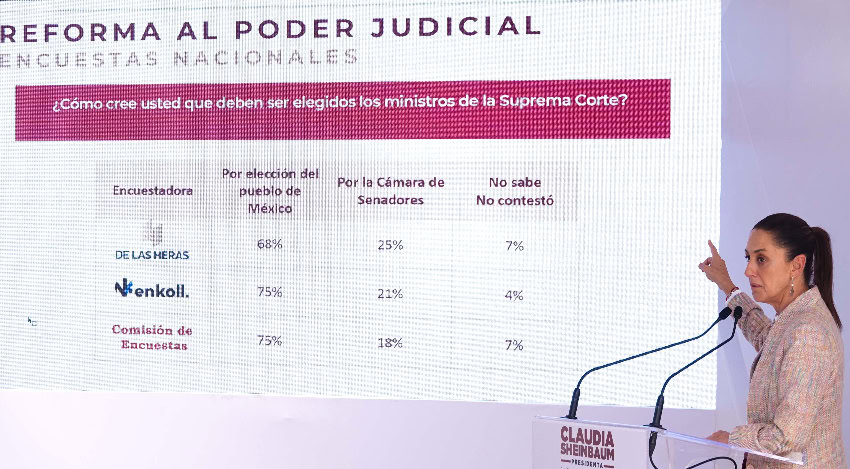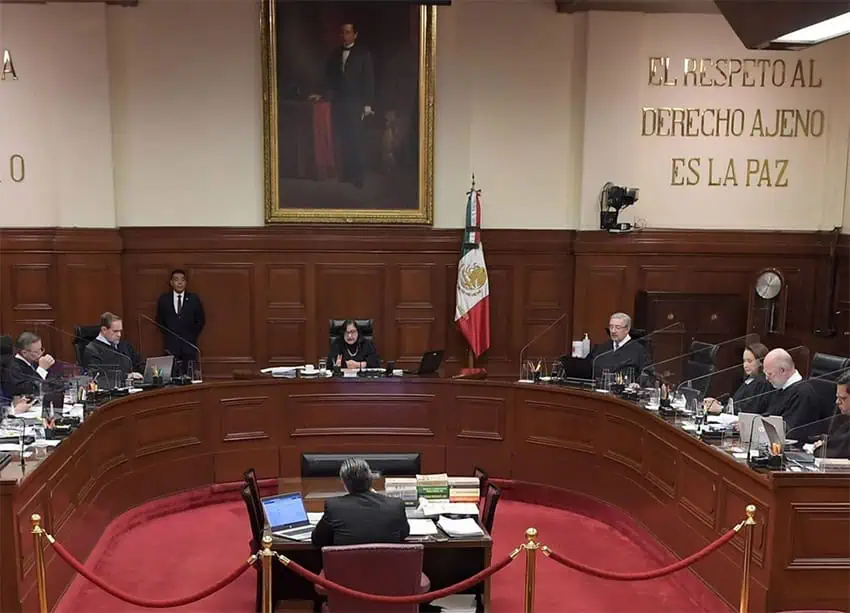Mexico’s business community is split over the federal government’s judicial reform proposal, while support among the general population for the plan to allow citizens to directly elect judges has declined.
They are among the takeaways from the results of two polls conducted this month ahead of the Congress’ consideration of the controversial constitutional bill in September.

A poll carried out by the Confederation of National Chambers of Commerce, Services and Tourism (Concanaco Servytur) in collaboration with the company Arias Consultores found that 52% of more than 1,000 leaders in those sectors are in favor of the proposed judicial reform, while 48% are opposed.
Just under half of the respondents said they were “very informed” (49.3%) about the proposal, while just over half said they were poorly informed (46.1%) or not at all informed (4.5%).
A separate El Financiero newspaper poll found that 44% of 500 respondents are in favor of judicial elections, down from 64% in January.
The judicial reform proposal is currently the most contentious issue in Mexico politics.

President Andrés Manuel López Obrador, who sent the proposal to Congress in February, would like to see the initiative approved before he leaves office on Oct. 1. He is a staunch critic of Mexico’s judiciary, arguing that many judges are corrupt and at the service of the nation’s elite rather than the majority of Mexicans.
As of Sept. 1, the ruling Morena party and its allies will have a supermajority in the lower house of Congress, and a near-supermajority in the Senate, putting them in a very strong position to approve the reform.
The proposal, modified by Morena earlier this month and approved by a congressional committee this week, has faced significant criticism, including from United States Ambassdor to Mexico Ken Salazar.
A reform is ‘needed,’ says Concanaco Servytur
Presenting the survey results on Wednesday, Concanaco Servytur president Octavio de la Torre said that the organization he leads has established that “a reform to the judicial power is needed,” but stressed that “the most qualified people” should be candidates in judicial elections.
One of the criticisms of the reform is that it could lead to the election of people without sufficient experience as judges. President-elect Claudia Sheinbaum has asserted that won’t happen.
De la Torre said that it is “essential” that “the best people” adjudicate cases in Mexico’s courts.
Six in ten of 1,043 respondents to the Concanaco Servytur survey believe there is “a lot of corruption” in Mexico’s judicial system, while 75% favored the establishment of an independent body to oversee the conduct of Supreme Court justices, judges and magistrates elected by the Mexican people.

De la Torre said that Concanaco Servytur is drawing up a range of proposed amendments to the reform proposal that will be submitted to recently elected deputies. He said he hoped the proposed modifications will be discussed and “attended to” by the lawmakers, who will assume their positions this Sunday.
Only 28.7% of survey respondents said they had “a lot of confidence” in the current government’s capacity to manage the legislative process of the judicial reform proposal, while that figure rose to 34% with regard to the government of incoming president Sheinbaum, who has advised lawmakers to be “careful with the procedural stage” and “not rush.”
Majority of citizens support appointment of judges over election
El Financiero’s most recent judicial reform poll yielded some curious — and conflicting — results.

While the number of people in favor of the reform was almost the double the number against it, a majority of respondents said that Supreme Court justices, judges and magistrates should be appointed based on their knowledge, experience and impartiality rather than elected by the people.
The 500 respondents were asked to express their support or opposition for the reform on a scale of 1-10, with 10 meaning “completely” in favor and 1 meaning “completely” against.
Forty-five percent of the respondents were deemed to be in favor of the reform (7-10), while 24% were determined to be against it (1-4). The remaining 31% were either neutral (5-6) or declined to say whether they supported the reform or not.
Using the same scale, respondents were specifically asked whether they supported or opposed the election of judges in elections – the most controversial aspect of a broader reform initiative.
Forty-four percent of respondents were in favor of the direct election of judges, while 38% were opposed. The former figure increased two points compared to El Financiero’s July poll, but declined markedly from 59% in June and 64% in January.
Asked whether judges should be appointed — as is currently the case — or elected, 54% of those polled said appointed versus 42% who said elected. Last month, El Financiero found 65% support for the former option.
Just over half of the respondents — 53% — said they knew “little or nothing” about the reform proposal, while 43% said they knew “a lot” or “something” about it.
Two thirds of respondents approved of the performance of the Supreme Court — which has drawn the ire of López Obrador by handing down decisions against the government — while just one-quarter disapproved of the court’s work.
With reports from El Economista, El Sol de México, Aristegui Noticias and El Financiero
